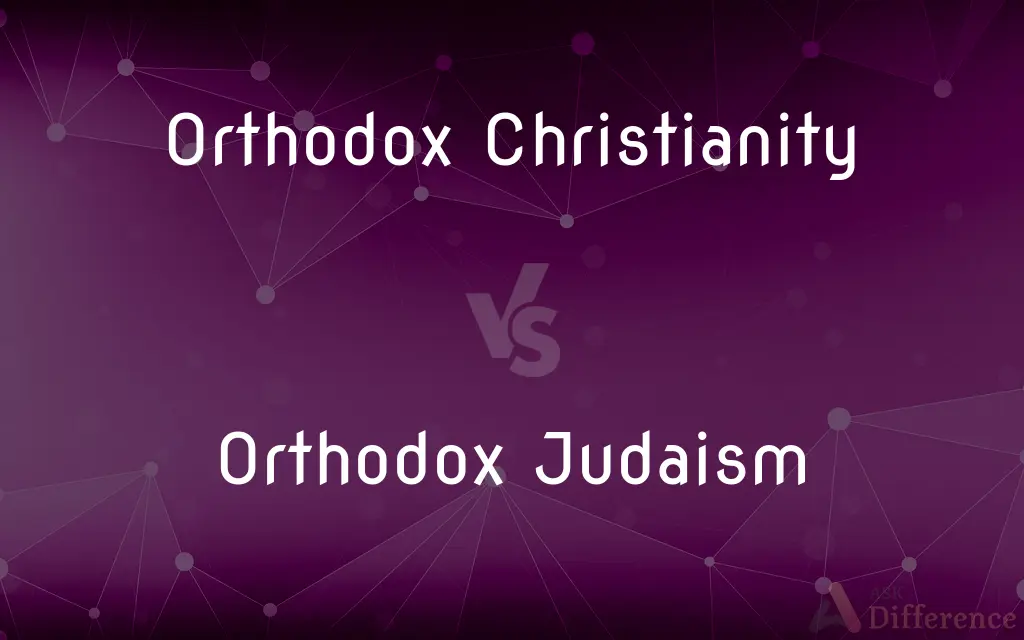Orthodox Christianity vs. Orthodox Judaism — What's the Difference?
Edited by Tayyaba Rehman — By Maham Liaqat — Published on March 5, 2024
Orthodox Christianity focuses on following early Christian traditions and beliefs, emphasizing the Trinity, while Orthodox Judaism adheres strictly to traditional Jewish law and practices, centered around the Torah.

Difference Between Orthodox Christianity and Orthodox Judaism
Table of Contents
ADVERTISEMENT
Key Differences
Orthodox Christianity is rooted in the earliest Christian traditions, maintaining a theological and liturgical tradition that traces back to the Christian church of the first millennium. It emphasizes the mystery of the Holy Trinity and the incarnation of Jesus Christ. Orthodox Judaism, on the other hand, is centered around strict adherence to the Torah and Talmud, focusing on the covenant between God and the Jewish people.
The worship practices in Orthodox Christianity involve liturgies, sacraments, and iconography, aiming to bring believers into communion with God through Jesus Christ. In contrast, Orthodox Judaism's practices are centered around prayer, the observance of the Sabbath, and dietary laws, aiming to fulfill the commandments given by God in the Torah.
Orthodox Christianity is divided into several autocephalous churches, such as the Greek Orthodox and Russian Orthodox Churches, each with its hierarchy but united in doctrine and worship. Orthodox Judaism is structured around rabbinical leadership and communities, with variations in practice and interpretation within its own sects, such as Hasidic and Modern Orthodox Judaism.
The concept of Messiah in both traditions presents a significant difference: Orthodox Christianity believes Jesus Christ is the Messiah who has already come, focusing on his death, resurrection, and the promise of eternal life. Orthodox Judaism awaits the coming of the Messiah, who will restore Israel and bring peace to the world.
Orthodox Christianity uses the New Testament along with the Old Testament as its scriptural foundation, interpreting the Bible through the lens of Christ's teachings. Orthodox Judaism relies on the Tanakh (the Hebrew Bible) and the Talmud as its primary texts, guiding daily life and religious practice.
ADVERTISEMENT
Comparison Chart
Central Beliefs
Trinity, Incarnation of Jesus Christ
One God, adherence to the Torah
Worship and Practices
Liturgies, Sacraments, Iconography
Prayer, Sabbath observance, Dietary Laws
Scriptural Texts
Bible (Old and New Testaments)
Tanakh, Talmud
View of Messiah
Jesus Christ is the Messiah
Awaiting the Messiah
Organizational Structure
Autocephalous churches, unified in doctrine
Rabbinical leadership, community-based
Compare with Definitions
Orthodox Christianity
Adherence to early Christian traditions.
Orthodox Christianity maintains ancient liturgical practices.
Orthodox Judaism
Practices Sabbath observance.
The Sabbath is observed from sunset on Friday until nightfall on Saturday in Orthodox Judaism.
Orthodox Christianity
Celebrates sacraments.
Sacraments like the Eucharist are central to Orthodox Christian life.
Orthodox Judaism
Strict adherence to the Torah.
Orthodox Judaism follows the Torah's commandments meticulously.
Orthodox Christianity
Uses icons in worship.
Icons play a significant role in Orthodox Christian worship.
Orthodox Judaism
Observes dietary laws.
Kashrut, the dietary laws, are strictly followed in Orthodox Judaism.
Orthodox Christianity
Believes in the incarnation of Jesus.
Orthodox Christianity emphasizes the incarnation and resurrection of Jesus Christ.
Orthodox Judaism
Awaits the Messiah.
Orthodox Judaism holds a belief in the future coming of the Messiah.
Orthodox Christianity
Focuses on the Trinity.
The Trinity is a central doctrine in Orthodox Christianity.
Orthodox Judaism
Centers around prayer and study.
Daily prayer and Torah study are fundamental aspects of Orthodox Jewish life.
Common Curiosities
What is the main difference between Orthodox Christianity and Orthodox Judaism?
The main difference lies in their core beliefs: Orthodox Christianity focuses on the divinity of Jesus Christ and the Holy Trinity, while Orthodox Judaism is centered on monotheism and adherence to Jewish law.
What are the dietary laws in Orthodox Judaism?
Dietary laws, known as Kashrut, include prohibitions against eating pork and shellfish, and requirements for the slaughter and preparation of meat.
Can Orthodox Christians marry Orthodox Jews?
Interfaith marriages are generally discouraged in both communities due to the significant differences in religious beliefs and practices.
How do Orthodox Christians and Orthodox Jews view the Bible?
Orthodox Christians use both the Old and New Testaments, seeing Christ as the fulfillment of the Old Testament prophecies. Orthodox Jews use the Tanakh and regard the Talmud as a key interpretative text, focusing on the laws and teachings as directly applicable to daily life.
How is the leadership structured in Orthodox Christianity and Orthodox Judaism?
Orthodox Christianity is organized into autocephalous churches with bishops and priests. Orthodox Judaism is centered around rabbinical leadership and community-based congregations.
Do Orthodox Christians and Orthodox Jews celebrate the same holidays?
While both may observe some shared religious holidays such as Passover and Pentecost, the significance and manner of observance often differ greatly due to their distinct theological perspectives.
How do Orthodox Jews interpret the commandments in the Torah?
Orthodox Jews follow a strict interpretation of the Torah's commandments, applying rabbinical commentary and the Talmud to guide their application in modern life.
Are there different sects within Orthodox Christianity and Orthodox Judaism?
Yes, both have various sects. Orthodox Christianity includes the Greek, Russian, and Serbian Orthodox Churches, among others. Orthodox Judaism includes Modern Orthodox, Haredi, and Hasidic communities.
What is the significance of icons in Orthodox Christianity?
Icons are venerated as sacred art that brings the believer into a deeper communion with the divine.
What is the Sabbath, and how is it observed differently?
The Sabbath is a day of rest and worship. In Orthodox Christianity, Sunday is observed in commemoration of Jesus Christ's resurrection. In Orthodox Judaism, the Sabbath is from Friday sunset to Saturday nightfall, dedicated to rest and spiritual enrichment.
What role does the Messiah play in Orthodox Judaism?
The Messiah is seen as a future leader who will restore Israel, rebuild the Temple in Jerusalem, and bring peace to the world.
How do Orthodox Christianity and Orthodox Judaism approach theological debate?
Both value theological study and debate but within the framework of their respective traditions and authoritative texts.
How do Orthodox Christians view Jesus Christ?
Jesus Christ is central to Orthodox Christianity as the Son of God, whose life, death, and resurrection are the foundation of their faith.
How do Orthodox Christian and Orthodox Jewish communities view modernity?
Both communities strive to maintain their traditional beliefs and practices in the modern world, though there is variation in how individuals and subgroups navigate modernity.
What is the role of prayer in Orthodox Judaism and Orthodox Christianity?
Prayer is central in both, serving as a means to communicate with God, though the forms and times of prayer differ.
Share Your Discovery

Previous Comparison
E-Commerce vs. E-Bbusiness
Next Comparison
Part Time Job vs. Casual JobAuthor Spotlight
Written by
Maham LiaqatEdited by
Tayyaba RehmanTayyaba Rehman is a distinguished writer, currently serving as a primary contributor to askdifference.com. As a researcher in semantics and etymology, Tayyaba's passion for the complexity of languages and their distinctions has found a perfect home on the platform. Tayyaba delves into the intricacies of language, distinguishing between commonly confused words and phrases, thereby providing clarity for readers worldwide.
















































